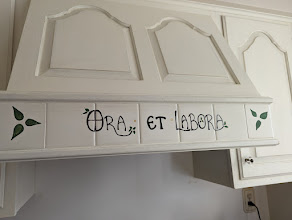Since I last wrote, one daughter received her first Holy Communion, three children received the Sacrament of Confirmation, I started post-trauma therapy, sold and packed a house, caravanned 2600 miles with a truck of stuff and van of people, and a dear friend passed away. Since school started, half of us have been sick with something, including the toddler (=no sleep for my husband and I). We’ve also been delightfully busy with fun and wonderful things to do: a musical, a Shakespeare play, Trail Life, swing dancing, school dances, homework, parties. Between festivities and illness and grief and trauma work and budding new relationships and new EVERYTHING… I’m tired y’all.
There’s good weariness, like after a satisfying workout or Christmas shopping. And this is for sure a good weariness. This big move (which I will talk about more later) has been fruitful. It’s just a lot. I feel like we built a new house very quickly and now the foundation has to settle.

Through therapy and by necessity through the fast-forward events of this past year, I’m trying to chill spiritually. Not laziness, but less anxiety. The first day of this year, I had a three-hour Confession-session, one of the juicy fruits of which was realizing how much I have felt I needed to EARN love. (thud) I needed to relax and enter into God’s unsolicited love for me. And this year has offered ample time to do so. All I do is pray on the run. St. Thérèse called it “ejaculatory prayer” which, while jarring to our modern ear, is a mother’s arsenal. And if prayer is– also St. Thérèse– a “glance toward Heaven”, then (sigh) that’s all I got right now.
I know it’s not a form of life-sustaining prayer. The relationship has to be there, has to strengthen and grow through the sacraments, contemplative prayer, adoration, Scripture, etc. And I’m looking forward to entering into another period like that. But right now, God is balancing me on this highwire. There’s a lot less of me, and a whole lotta Him. And honestly, it’s nice to know that when I let go, He will catch and carry me.

About five years into motherhood, I discovered the Benedictine motto “ora et labora”– pray and work– and it’s been my lifeline ever since. I’ve always had the phrase near at hand to remind me of how to anchor my vocation. I just painted it on the hood over the stove in our new house. It feels a little more like home now. And it’s a reminder that praying in weariness, little glances towards Heaven, is about resting in God’s unsolicited love, offering the little I have, receiving a hundredfold.
